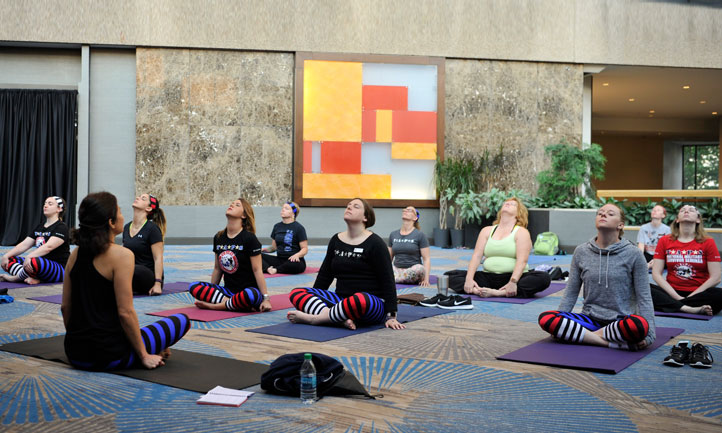The Unstuck Approach
Author: James Gordon
I believe treatment for depression should be integrative. It’s a way to get unstuck, to help us move through and beyond depression and other difficulties that our lives may bring us.

In my book, “Unstuck: Your Guide to the Seven-Stage Journey Out of Depression,” I explain that this comprehensive approach combines conventional treatments, including various forms of psychotherapy, with other techniques to enhance a person’s emotional life, cognitive abilities and physical health. Medication is sometimes used, but only when other combined treatments don’t work.
Though the integrative approach is safe and appropriate for everyone, including children (who are increasingly diagnosed with depression), it is especially useful for women, whose rates of depression are twice as high as those of men.
Research is unclear concerning this difference, but it may be related to hormonal balance in the female body — particularly prior to menstruation and postpartum — and perhaps to a higher incidence of thyroid dysfunction. In my opinion, an approach that encourages women to take charge of their own treatment, and gives them the self-care tools to do it, helps transform this conditioned sense of powerlessness.
Working with a skilled therapist can be important, even crucial, in healing from depression, but that work can be exponentially enhanced by what you do for yourself.
The goal with the Unstuck Approach is to learn to understand and help ourselves, so we can overcome feelings of helplessness and hopelessness that are hallmarks of depression. Here are the key elements. All have been demonstrated to relieve depression. Used together, each enhances the effectiveness of the others.
Practice Mindfulness
Mindfulness helps people become relaxed, aware and firmly grounded in the present moment. I teach specific meditation techniques such as slow, deep, soft-belly breathing and mindful walking and eating, which have been shown to decrease levels of anxiety and stress, enhance mood and optimism and promote greater emotional stability and more reliable judgment.
Neuroscientist Sara Lazar, Ph.D., of Harvard Medical School and Massachusetts General Hospital, has shown that regular meditation increases the thickness of the cerebral cortex in parts of the brain associated with executive functions such as reasoning and responsiveness.
Increase Movement and Exercise
Movement is central to an integrative approach. Research has shown repeatedly that exercise equals antidepressants in relieving symptoms of depression and raising neurotransmitter levels. A number of studies, including several done at Duke University by James Blumenthal, M.D., and his colleagues, show exercise-triggered mood increases at least as great as those achieved with antidepressants — and sometimes better.
They suggest at least 30 minutes of daily exercise is optimal (this is much easier when it’s an activity you enjoy), but all of us should start with what we can do — and what we like to do. Walking a couple of blocks a day is a great beginning.
Improve Nutrition
How we eat can be crucial in preventing, as well as treating, depression. People who are depressed may be deficient in one or more nutrients, including B Vitamins, Vitamin D3, Selenium, Magnesium and Omega-3 fatty acids. Some people are sensitive to gluten and other food substances that may cause inflammation, which has been implicated in depression.
Also, we are just now beginning to understand the complex relationship between the gut, the brain and our emotional well-being. One of the intriguing recent findings is that probiotics, which normalize gut bacteria, may provide significant relief to people who have been diagnosed with depressive disorders. The supplement regimen I prescribe usually includes a daily probiotic — a combination of acidophilus and bifidus — with two to three billion live bacteria.
Stimulate Imagination and Intuition
Creative practices nourish the body and mind. I teach techniques like guided imagery, drawing and spontaneous written dialogues with one’s symptoms, problems and issues. These often help depressed and anxious people access their imaginations and use intuition to address emotional challenges.
For example, using a technique called Wise Guide, a 13-year-old boy with whom I was working closed his eyes and imagined himself in a safe place. When I suggested that he envision a “wise guide,” he visualized a large, kind dog named Friend. When the boy asked Friend how he could deal with his anxiety about tests and speaking in class, Friend advised him to imagine that he, Friend, was sitting next to the boy in school, and that the boy was hugging him. The image quieted the boy’s fears. He began to speak up in class and his grades improved.
Get Support
Many people find that being part of a group where they share experiences and learn skills multiplies the benefits of their self-care. In the Mind-Body Skills groups that we’ve developed at the Center for Mind-Body Medicine, professionals teach self-awareness and a variety of self-care skills. Participants are treated as students, not as damaged or ill patients. They often say they feel like pilgrims together on a journey toward greater understanding, health and wholeness.
Connect to Something Greater
Using self-care techniques and living more meditatively often paves the way for us to connect with something greater than ourselves — God, nature, a higher power — and to find meaning and purpose in our lives. A sense of connection, meaning and purpose is among the most powerful proven antidotes to depression. So, look for ways to tap into that feeling regularly, whether it’s developing a daily reflective ritual, attending a spiritual service or volunteering to help those in need. As your sense of meaning and purpose expands, your vulnerability to depression will diminish.
Adapted with the permission of Experience Life magazine from the article “Free Yourself from Depression.”
By James S. Gordon, M.D., a Harvard educated psychiatrist, is a world-renowned expert in using mind-body medicine to heal depression, anxiety and psychological trauma. He is the Founder and Executive Director of The Center for Mind-Body Medicine and a Clinical Professor in the Departments of Psychiatry and Family Medicine at Georgetown Medical School.
